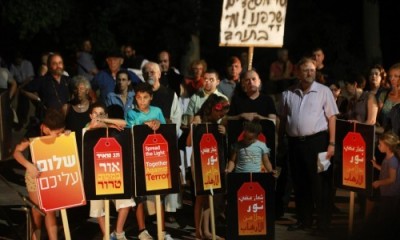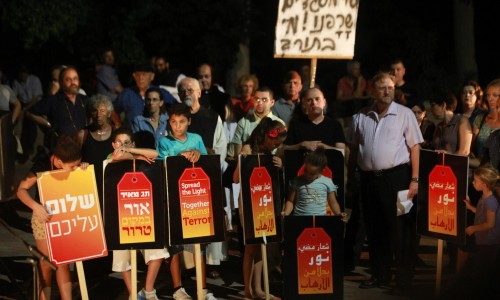
This was a bad week for people who believe in human progress. Whether you imagined America was on its way towards becoming a post-racial society or that residents of the Levant could maybe learn to live peacefully side-by-side someday soon, the better dirt of our nature has again graffitied and burned down our delusions.
What happened in Israel this week struck a particularly personal chord for me. While I was a student at the Pardes Institute of Jewish Studies in Jerusalem, two things were routinely emphasized by people who lived in Gush Etzion: The first was that, in spite of what some activists said, Hebron is not a microcosm of Israel, rather tense but much more moderate, much quieter Jerusalem is, and second that the Rami Levi supermarket in Mishor Adumim, where Jewish settlers and Palestinians shop and work together without incident, is how life actually is in the Gush. Both claims matched my experience—the first because the open, festering sore that is Hebron was clearly not like anywhere else in the country, the second because grit teeth and the risk of losing everything are obviously the only things keeping that situation from exploding.
The question of whether Hebron or Jerusalem is a better gauge of the life in Israel actually came up frequently during my first year at Pardes in the wake of our school trip to Hebron. That long day exposed us to every opinion, and endless confusion. As I wrote at the time, the animosities and hatred so deeply ingrained in everyone who lives in Hebron left not just me, but most of my peers feeling scarred, jaded, and all but hopeless. I called Hebron then “religion at its absolute worst,” though I now think it’s really “humanity at its absolute worst.”
A few days after that trip, I had the privilege of touring the Max Rayne Hand-in-Hand School in Jerusalem with my Social Justice class.
In contrast to Hebron, this school offered a peek at humanity at its absolute best. Each classroom has a Muslim and a Jewish teacher. Students learn Hebrew, Arabic, and English; the Hebrew Bible, New Testament, and Koran with equal respect (side note: at the school, the Jewish stuff was in Hebrew the Islamic stuff was in Arabic, and the Christian stuff was in English); Jewish, Arab, and Christian students form real friendships, an unfortunate if understandable rarity in Jerusalem. Of course the school isn’t perfect—it has its tensions and its flaws, but nothing is perfect, and I think any institution so devoted to teaching coexistance and mutual understanding needs to be supported through its problems. My experience there gave me some small glimmer of hope for the region’s future after experiencing the hellhole of Hebron.
That week was almost exactly three years ago, in December 2011. Now, with the peace process all but dead, terror attacks again a common occurrence, hate rallies in the streets, extreme right-wing politicians gaining mainstream acceptance, PM Netanyahu firing his two most moderate ministers and still favored to win new elections, and the Hand-in-Hand school and even the Rami Levi attacked within days of each other, I’m not so sure that our presenter from Breaking the Silence was so wrong after all. And if he was right, if Hebron really is now a microcosm of Israel, then the future feels all but hopeless. And oh, yeah, the Brown and Garner verdicts in America.
Yet I refuse to despair, if for no other reasons then because I’m a Jew and hope is what we do and, related, because holding on to some small morsel of hope, no matter how naive, is better than crying. To be clear, hope to me doesn’t mean some vague sense that everything will be okay in the end, rather it’s the confidence that if good people refuse to stop trying, things will be better for everyone than they currently are.
Put differently, to me hope means making new friends who are different from your current ones. This kind of hopefulness is why last month I went to pack food for New York’s hungry at the first meeting of the New York Muslim-Jewish Solidarity Committee, of which I am now a proud member. Similar communities are now being established all-over the world, all devoted to Muslims and Jews doing good for our local communities, learning about each other’s cultures, and standing up for the other when they face prejudice.
This hope is also why I’m attending the Black Lives Matter rally in New York today. After the attack on his school, Arik Sporta, Hand-in-Hand’s principal, said, “If there is anything saving Israeli democracy these days, it is activity like ours. …We just feel stronger.” Drop the “Israeli” from the sentence, and it’s still true—if there’s anything saving democracy these days everywhere in the world, it’s institutions and rallies like these.
I believe strongly as I believe anything that the only fitting response to acts of extremism from any side is acts of common sense, moderation, and decency from the rest of us. These acts won’t always be as newsworthy, but this is really the only way lasting change happens—under the radar, at the grassroots, among individuals.
Politics can’t solve chronic societal problems in any lasting or substantive way; the only way we can change things is as neighbors. The civil rights and gay rights movements in this country only made the progress they have once the majority (whites and straights, in this case) got to know personally those they were oppressing.
The proper response to the attacks in Israel is thus, I think, to rebuild the school with more students than it had previously in Jerusalem and to build more schools like it in other cities. The proper response to systemic injustice in America is to get educated and get involved.
Things will only get worse until enough people take it upon themselves to make them better.
Derek M. Kwait graduated from the University of Pittsburgh and is editor in chief of New Voices.

